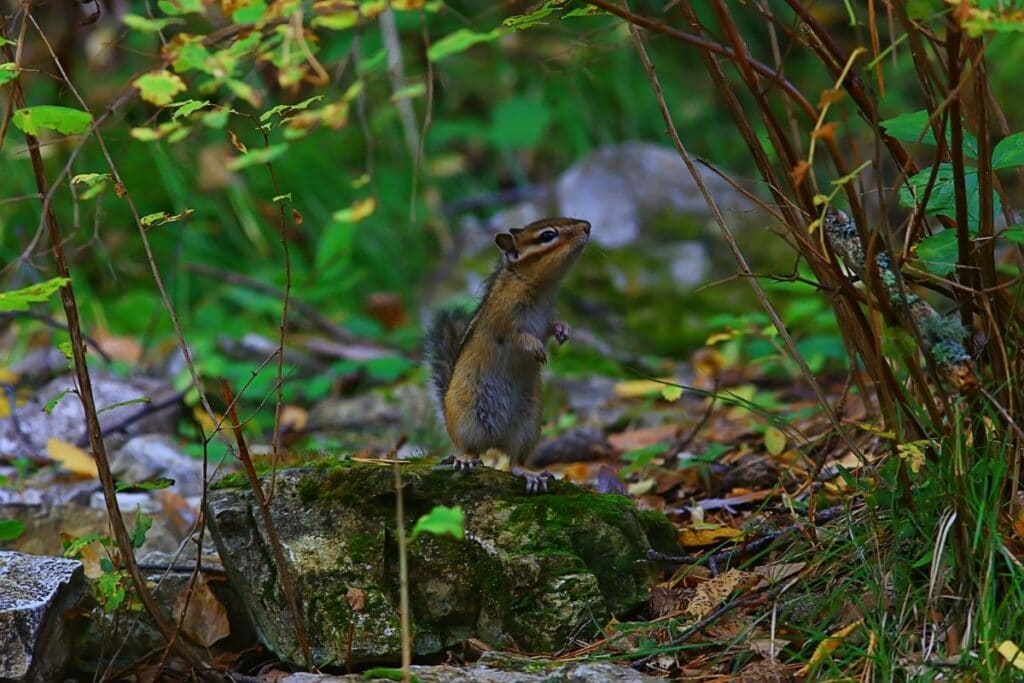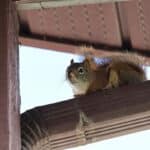Want to learn how to keep chipmunks out of the garden? Look no further than this post.
Chipmunks are adorable animals that, for the most part, cause a minor nuisance around the yard. However, there are times when chipmunks become extra bold in their treatment of your precious plants. Chipmunks have been known to eat fruits and veggies, destroy tender seedlings, and do their business amongst your garden.
If you have a chipmunk problem around your garden, then keep on reading. Below you’ll find a list of ten tips that will surely lessen the negative impact chipmunks have in your yard. If not, get rid of the chipmunks completely.
What Attracts Chipmunks to the Garden?
Chipmunks are a part of nature. Often, the gardens we keep around our homes serve as valuable resources for wild animals, including chipmunks. Because of that, chipmunks may be attracted to your garden for a variety of reasons.
- Food – many of the plants we grow attract chipmunks. They are especially attracted to fruit-bearing plants like elderberry, nut-bearing plants like oak trees, and seed-bearing plants like sunflowers and sunflower seeds.
- Water – when water is scarce in the wild, chipmunks may want to visit your garden in search of water. Ponds, pools, and puddles may all be bringing chipmunks into your yard from the wild.
- Shelter – chipmunks may also be frequenting your garden because of the shelter it provides. Large decorative grasses, evergreen trees, and shrubs are often utilized by chipmunks looking for a safe haven from natural predators.
How Do I Keep Chipmunks Away from Vegetable Garden
Squirrels and chipmunks love our gardens for their opportunities in terms of shelter, food, and water. Most of the time, it’s wonderful that these little critters want to enjoy the garden. However, if they start to cause problems, and eat your food, it becomes time to step in.
Strategies for keeping chipmunks out of your vegetable garden, especially away from strawberries, tomato plants and planters revolve around four important tenets.
- Eliminate the easy accessed food and shelter
- Prevent them from returning by proactively applying repellants
- Outsmart the pesky animals with decoys and deterrents
- When in doubt, hire a professional for specialized guidance
How to Deter Chipmunks
We could share all sorts of tips and tactics that would help keep chipmunks out of your garden. The truth is, not all of them work 100%. That is why we’ve compiled the strategies many gardeners have used and found to be the most effective.
Experiment with some of the tips below. Remember, often, it’s best to use multiple tactics at once to create the most effective chipmunk prevention plan.
1. Install a Fence
These members of the squirrel family are good diggers and even better climbers. For that reason, a fence may not always be the best solution. However, a fence comprised of chicken wire or mesh may do the trick.
If you want to erect some sort of physical barrier, make sure that the holes are no bigger than ¼ inch. It will also be essential to bury the mesh at least 6 inches into the soil to prevent chipmunk burrows. You may also consider laying the chicken wire on top of the soil to protect new seedlings and plants that grow from flowering bulbs
2. Incorporate Smelly and Pokey Plants In Your Garden
We recommend that you incorporate pokey plants and plants with intense aromas into your garden landscape to repel animals like chipmunks and squirrels.
For example, daffodils, black-eyed Susans, lupine, aster, coreopsis, and purple coneflower can all be planted amongst crops or on the borders as chipmunk repellent plants.
Fragrant plants are also good at repelling chipmunks. Sage, mint, lavender, cilantro, and garlic are all good examples of herbs that chipmunks tend to avoid. You position these herbs in strategic places in order to keep chipmunks away from sensitive plants. Plus, you’ll have fresh herbs ready to go for any recipe at a moment’s notice!
3. Spray or Sprinkle Chipmunk Repellents
When it comes to repelling chipmunks, repellents are one of the most popular and effective measures you can take when you want to keep chipmunks and other critters out of your garden. The reason is that many repellants can be made at home with ingredients that you already own.
What repels chipmunks is an odor barrier that chipmunks dislike. When properly applied, repellents can drastically reduce the presence of chipmunks in the garden.
The most effective chipmunk repellents will use any of the following ingredients: hot cayenne pepper, chili powder, garlic, apple cider vinegar, citrus essential oils, peppermint, Epsom salt, coffee grounds, or baby powder. These ingredients also help repel rodents and other pests too.
4. Wrap Your Trees
Chipmunks sometimes like to scratch tree bark and climb up trees. This is especially the case for smaller and younger trees. If you are noticing that chipmunks are damaging your trees, or climbing them to access the fruits, then you may need to protect your trees.
The easiest way to do this is to wrap the base of the tree with plastic or aluminum foil. The new exterior layer will prevent scratching and diminish the chipmunk’s ability to gain traction on the tree bark for climbing.
You can also use this method to protect fruit trees from squirrels.
If you notice that chipmunks are picking on particular plants, you can also wrap those plants with chicken wire or mesh in order to still allow them room to grow but also protect them from pesky chipmunks. This also helps protect the bird feeders.
5. Position Plastic Predators Around the Garden
In general, chipmunks are pretty low down on the food chain, which means there are many larger animals that consider them to be prey. For that reason, chipmunks are skittish little animals.
You can take advantage of their skittishness by planting plastic predators around your garden. Plastic snakes, owls, and birds of prey all function fantastically as deco predators. The chipmunks will see the decoys and consider the space unsafe.
When using decoys, it’s important to remember that you need to switch up the locations that you position them in. Otherwise, the chipmunks and other prey animals will catch on to the fact that the plastic predator isn’t a threat. A predator that moves around the yard is much scarier than one that stays in one spot day after day.
6. Let Your Pets Enjoy the Yard
If you own pets, then you are in luck. Your pet dogs and cats are one of the simplest ways you can prevent animals like squirrels and chipmunks from coming into the yard. The reason is that many small animals like chipmunks consider dogs and cats to be predators.
The more time that your pets can enjoy the yard, the better. With time, they will leave behind samples of their fur and strong scents from their urine and fecal matter.
Chipmunks spend catch onto these predatory urine scents and avoid the area for safety reasons. If you don’t own any pets but want to try out this strategy anyway, we recommend you head over to your local pet groomer and ask to use some of the extra fur they have lying around.
7. Install Motion-Activated Deterrents
We can’t always be out in the garden to fend off the pesky animals that may be digging holes and helping themselves to the fresh fruits and veggies. That’s why motion-activated deterrents are so helpful in scaring away chipmunks. They can protect your garden even when you and the pets are not around.
Motion-activated sprinklers are one of our favorite deterrent tactics. The sudden burst of water, along with the surprising noise, easily scares off chipmunks. Plus, your plants get some additional watering.
8. Try Ultrasonic Deterrents
A widespread tool often used in pest control is ultrasonic deterrents. Ultrasonic repellents are motion-activated gadgets that emit high-frequency sound. The sound is not audible to the human ear. However, it is unbearable for small animals.
After a while, the chipmunks will associate the area that you’ve installed the deterrents in as unsafe, and they will choose to go elsewhere.
9. Keep Your Trash Cans Secured
Chipmunks may be coming to your property because of the easy access to food. Chipmunks like fresh fruits, nuts, seeds, and veggies, but they will also get into your trash if it is easily accessible. That is why it’s important to ensure your trash cans are properly secured every night.
Never just leave bags of trash outside. Always remember to close the lid properly. You can add extra security to your trash cans with bungee cords if you need to. Taking precautions with how your trash is stored will help keep chipmunks away and raccoons and rodents.
10. Hire A Professional To Trap the Chipmunks
If the chipmunk problem is especially hard to deal with, there may come a time when you consider hiring a professional. Pest control professionals can often employ tactics to control the pest problem that you should not, like trapping.
Trapping chipmunks and other wild animals is often regulated by local laws and ordinances. That is why we never recommend trapping wild animals by yourself. Hiring a professional will ensure that the trapping is done humanely and that the chipmunks are correctly released.
How to Keep Chipmunks Out of Garden Naturally
Chipmunks are cute little critters. However, that doesn’t mean you want them rummaging around your garden and eating your plants. You also probably don’t want to hurt the chipmunks and would prefer to learn how to get rid of chipmunks in your yard in a natural and humane manner.
The good news is that there are plenty of ways to keep chipmunks out of your garden naturally. Many of the tactics we talked about above are good examples. Try out some of the strategies we mentioned, and remember these essential tips:
- If applying repellents, constantly reapply after rainfall and watering
- Switch up the locations of the plastic decoy predators you are using
- Let your pets out to play as much as possible
- Never trap a wild animal without consulting or hiring a professional ahead of time
There is a solution for every problem. Remain patient, and switch up the tactics you use. With time, you will have your chipmunk-free garden back. Good luck!
FAQs
What do chipmunks hate the most?
Chipmunks dislike strong smells and tastes, so they are often deterred by substances like garlic, cayenne pepper, or predator urine. Planting aromatic herbs like mint or placing strong-smelling items like garlic cloves or mothballs around areas where chipmunks are active can help deter them naturally.
How do you keep chipmunks away naturally?
To keep chipmunks away naturally, you can use physical barriers like fences or mesh netting to protect vulnerable areas of your garden. Additionally, removing food sources such as fallen fruit, seeds, or bird feeder can help discourage chipmunks from frequenting your yard.
What is the best repellent for chipmunks in the garden?
Some effective repellents for chipmunks include commercial products containing natural ingredients like garlic oil, pepper, or predator urine. These can be applied to areas where chipmunks are active or used in combination with physical barriers for greater effectiveness.
Do coffee grounds keep chipmunks away?
No, there is limited scientific evidence to support the effectiveness of coffee grounds in keeping chipmunks away. While some people believe that the strong scent of coffee grounds may deter chipmunks, results can vary, and other deterrent methods may be more effective.
What can you put on the ground to keep chipmunks away?
To keep chipmunks away from specific areas, you can spread substances like cayenne pepper, garlic powder, or predator urine around the perimeter of your garden beds or plantings. These strong-smelling materials can create a barrier that chipmunks are reluctant to cross.
See more: How to keep squirrels out of raised garden beds
*image by xload/depositphotos







